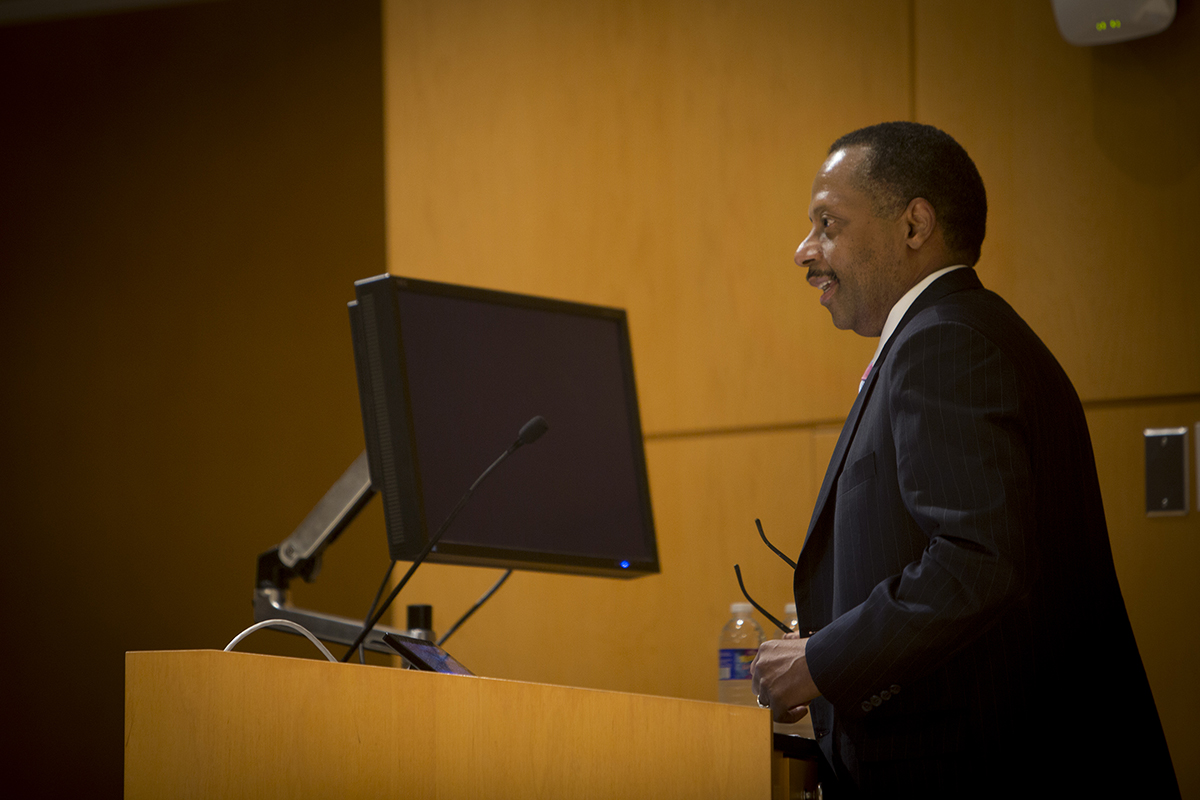Mellon president proposes humanities tackle slavery
By Robert Johnson

“When the world turns to the normally bodacious problems we call ‘grave challenges,’ shouldn’t the perspectives of humanists and artists be included to enhance what is known and how it is known?”
This was the central question upon which Earl Lewis, award-winning scholar and president of The Andrew W. Mellon Foundation, constructed his talk, “When the Past Is not the Past: Slavery and the American Psyche,” April 11 in Klarman Hall’s Rhodes-Rawlings Auditorium.
“There is a certain kind of knowledge – a wisdom – that is timeless and universally valuable to the human spirit, and humanists have access to it,” said Lewis, who was delivering the Society for the Humanities' annual invitational lecture on "The Future of the Humanities."
Lewis acknowledged that many in the academic world continue to call for the humanities to assume a more utilitarian character. On one hand, he maintained that the humanities, as a collection of many disciplines and fields of inquiry concerning the human experience, hold a value beyond instrumentality. On the other, however, Lewis professed support for a vision of the humanities “playing a central role in conversations that offer social as well as historical lessons.”
Connecting to the titular focus of his talk, Lewis said, “There are some profound questions that require humanists to take the lead as we take a look at how we deal with some profound notions of American life.”
Lewis proposed that cross-disciplinary teams led by humanists and supported by a multitude of institutions be assembled to tackle these questions. In his view, the best place for such teams to start addressing these challenging questions and the theme of public engagement would be to focus on American slavery, and its “long persistent entanglement with the daily affairs of the nation.”
Lewis said he recognized that some might question the appropriateness and relevance of starting with slavery, but he asserted that despite conventional wisdom, the history of American slavery is not merely a story of black bondage.
Lewis explained that there are many ignored or unrealized realities embedded in the history of American chattel slavery – such as the enslavement of millions of Native Americans – that, if uncovered and disseminated, could prove greatly beneficial to informing and improving the quality of contemporary discourse on America’s most pressing societal issues.
Lewis outlined three elements guiding the proposed project:
- a national campaign supported by the Mellon Foundation and others through grant-making and communication (but led by scholars, artists and administrators) that would produce 15 to 24 precepts on what the average American should know about slavery in the United States;
- the creation and management of a digital portal to existing and soon-to-be-created databases, websites and tools detailing slave history;
- and linking existing programs, events and activities designed to educate and engage the public on the topic of slavery and its lasting impact on contemporary American life.
“A project on slavery as a grand challenge is no easy undertaking,” Lewis admitted. “It is fraught with conceptual, interpretive, temporal and structural challenges. Even if we determine that this is a worthwhile endeavor, public reception and appreciation may prove illusive … but then again, that may be all the more reason to step into the breach and add a humanist’s perspective.”
Lewis concluded by saying, “As we look to the future of the humanities, I think [this] is an opportunity to be embraced. After all, in a world of contested truths, who better than humanists – armed with evidence, contexts, subtexts and texts – are better positioned to play a role.”
Before joining the Mellon Foundation, Lewis held faculty appointments at the University of California, Berkeley, and the University of Michigan, in addition to serving as provost and executive vice president for academic affairs and the Asa Griggs Candler Professor of History and African-American Studies at Emory University.
Robert Johnson ’17 is a writer intern for the Cornell Chronicle.
Media Contact
Get Cornell news delivered right to your inbox.
Subscribe